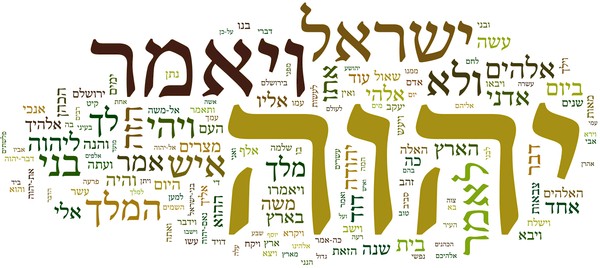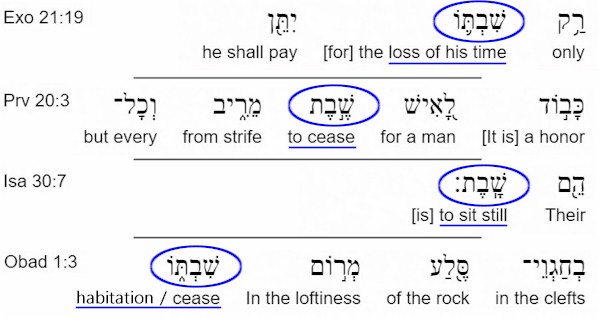Contents
Biblical Hebrew has a very limited vocabulary of less than 9000 words, but is tremendously rich in expressing itself.

Biblical Hebrew is the principal language of the Old Testament. To really understand the Bible, a comprehension of how Biblical Hebrew works can be very helpful. Read on …
In comparison to Biblical Hebrew, the 20 volume Oxford Dictionary exposes 171,000 English words in current use. Quite a difference. One might think that with an infinitely smaller vocabulary the Biblical Hebrew would be easier to understand. To the contrary, there’s much less controversy with the millions and millions of words in the Oxford Dictionary than the entire 419,687 words of the Old Testament, mainly in Biblical Hebrew.
(Origin of the Universe chapter 3.1)
If you happened on this page about Biblical Hebrew, I suggest you quickly read these other pages to find out the relationship between this language and The Explanation of what’s happening in our world: Why Theology?, Sacred Books and The Bible. You’ll better understand why this page talks about Biblical Hebrew.
Now, we are going to make a brief incursion into an interesting aspect and complexity (or simplicity) of Biblical Hebrew. This is greatly expounded in Origin of the Universe, the third book of The Explanation series.
It’s these complexities/simplicities which open the way for the multitude of ‘interpretations’ of the biblical texts. The cacophonic confusion that surrounds the most printed, and probably the least understood book of all times.
As one of my Hebrew teachers said, “every translation is an interpretation”. Simple and profound, each language has its own vocabulary that often doesn’t have an identical counterpart in another language. So, how do you decode it? This is where a translator’s sensitivity, culture, education and even belief or non-belief come into play.
Keep in mind that I’m not asking you to believe or accept any of this… what I’m saying, what you might think the Bible says or doesn’t say, whether the Bible is true or false. All of that is neither here nor there. We’re simply dealing with the literary best-seller of all times that was originally written in Hebrew. All we’re doing is analyzing some vocabulary.
Let’s jump into the deep end… the buoy is right there to grab onto
Here are four biblical texts from the Kings James Bible. Notice the highlighted, bold, italicized words.
Exodus 21:19
If he rise again, and walk abroad upon his staff, then shall he that smote him be quit: only he shall pay for the loss of his time, and shall cause him to be throughly healed.
Proverbs 20:3
It is an honour for a man to cease from strife: but every fool will be meddling.
Isaiah 30:7
For the Egyptians shall help in vain, and to no purpose: therefore have I cried concerning this, Their strength is to sit still.
Obadiah 1:3
The pride of your heart has deceived thee, you that dwell in the clefts of the rock, whose habitation is high; that says in his heart, Who shall bring me down to the ground?
In the image below, even if you have no knowledge of Biblical Hebrew whatsoever, it is easy to see that the 4 Hebrew words from excerpts of the four verses above have three identical letters: shin, beth, taf. (Hebrew is written from right to left that’s why the English is ‘jumbled’ and also needs to be read, in blocks, from right to left).

What I submit to you is this: From reading these four verses in English—in any and all translations—you’d never guess or know in 1000 years that these 4 phrases come from ONE ORIGINAL Hebrew word ‘Shevet’. And you’d be hard-pressed to find the relationship between these phrases, if any.
What, if anything, do these four English words from the single Hebrew word (shevet) have in common?
- Loss of time
- Ceasing
- Sitting still
- Habitation / cease
This short expose is not intended to give answers. It is simply to explain that beyond: Experience, Philosophy, Science and Religion there’s a fifth option: Theology. That possibly hasn’t been properly explored to find out about what makes our world tick.
If I go to the crux of the matter, and give you a little challenge… go and ask a well-known political or other experienced leader, go and question a philosopher, go and quiz a scientist, go and query a religious representative about those four verses above and ask them what, if any, relationship there is between the four different translations of the unique Hebrew word.
Can they enlighten us? I wonder, maybe… Well, theology can and will enlighten us.
In conclusion, this is just a hint, an inkling of what Biblical Hebrew is all about. You don’t have to read Biblical Hebrew; you don’t have to memorize it, you don’t have to learn its vocabulary to deepen your comprehension of theology.
I’m not going to give you the answer now to the above ‘question’ but I will give you the tools and show you the METHOD so you can Unlock Bible Meaning for yourself… and find the answer to the above enigma … and many others. Help and deeper understanding of Biblical Hebrew and ultimately the sacred book—the Bible—is not far away.
This blog post is an excerpt from chapter 3.1 of Origin of the Universe
Dig Deeper into The Explanation
Online Study Courses to Uncover the Mystery of Adam and Eve’s Nakedness… with no fuss. Free video mini-course revealing the God-intended meaning of Scripture via Biblical Hebrew. It’s so easy, it’ll blow you away. Join now and add new motivation to your Bible study.
Join The Explanation Newsletter to stay informed of updates. and future events. No obligations, total privacy, unsubscribe anytime, if you want.
The Explanation series of seven books. Free to read online or purchase these valuable commentaries on Genesis 1-3 from your favorite book outlet. E-book and paperback formats are available. Use this link to see the details of each book and buy from your favorite store.

Since you read all the way to here… you liked it. Please use the Social Network links just below to share this information from The Explanation, Biblical Hebrew – An Amazing Language, both Simple and Deep at the Same Time



Trackbacks/Pingbacks